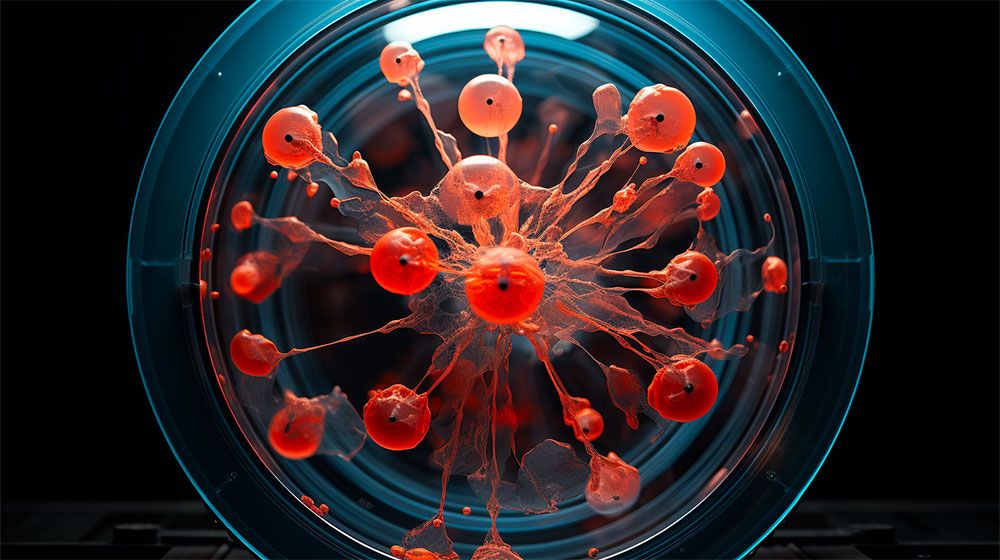Unlocking Longevity: How the Quest for Immortality Will Be a Trillion-Dollar Industry

In the quest for longevity, scientists, entrepreneurs, and innovators are redefining human possibilities. Scientific advances and technology are making longer lifespans achievable, reshaping both personal experiences and economies. This journey explores the science, technology, and societal impacts of extending life.
We delve into ground-breaking biomedicine, futuristic tech like AI-driven healthcare, and the ethical dilemmas they pose. We analyse pioneering ventures, examining their transformative potential on finances and societies. Discover the intersection of human potential and present-day opportunities as the pursuit of longevity transforms into reality, blurring lines between science, business, and ethics and reshaping our world.
The Age-Old Quest for Eternal Life
Throughout history, the pursuit of eternal life has been a driving force behind scientific exploration, folklore, and cultural narratives. Legends of elixirs, fountains of youth, and mystical potions have captivated the human imagination for centuries. While achieving immortality in the literal sense remains beyond our grasp, progress has been made in understanding the mechanisms of aging and how we might extend the human lifespan.
As a result of the convergence of cutting-edge disciplines like biotechnology, artificial intelligence (AI), and precision medicine, the pursuit of longevity has evolved into a multifaceted endeavour in the modern scientific landscape. Researchers are delving deep into the cellular and molecular processes that lead to aging, uncovering insights that could potentially slow down or reverse the effects of time on our bodies.
Studies have illuminated the role of telomeres, the protective caps at the ends of our chromosomes, in cellular aging and lifespan. The state in which cells lose their ability to divide has led to the development of therapies that aim to remove or rejuvenate these cells, potentially restoring tissue health. Also, advancements in genetic engineering offer the tantalising prospect of editing out genes associated with aging-related diseases, effectively delaying their onset.
The integration of AI and machine learning has propelled our ability to process and analyse vast datasets, allowing for more accurate predictions of health outcomes and personalised treatment plans. AI-driven algorithms are being employed to identify patterns in genetic and clinical data, offering insights into individual susceptibility to age-related diseases and enabling early intervention. The use of AI-powered drug discovery tools expedites the identification of compounds that could extend healthy lifespans.
Projected Growth of the Anti-Aging Industry
As the scientific community continues to explore the mysteries of aging, the anti-aging industry has surged into the spotlight. Market projections indicate a significant growth trajectory for this sector, encompassing a wide array of products and services to promote well-being and extend life spans.
Industry reports suggest that the global anti-aging market could experience substantial expansion in the coming years. Factors contributing to this growth include increasing awareness about preventive healthcare, rising disposable incomes, and the growing elderly population worldwide. From skincare products formulated with bioactive compounds to dietary supplements designed to support longevity, the market is witnessing a proliferation of offerings catering to a diverse range of consumers.
Basically, the age-old human desire for eternal life has metamorphosed into a scientific endeavour that converges biotechnology, AI, and precision medicine. The fascinating progress made in understanding the genetic, cellular, and molecular underpinnings of aging has paved the way for innovative interventions that could reshape the trajectory of human lifespans. As research continues to forge ahead and the anti-aging industry gains momentum, the prospect of enhanced longevity and well-being becomes more tangible than ever before.
Measuring Age: Biomarkers and Emerging Therapies

As science strides boldly into the sphere of longevity, the measurement of age itself becomes a fascinating journey. Innovative biomarkers that give a deeper understanding of a person's biological age are gradually supplanting and even replacing more conventional measures like the number of years since birth.
Advancements in the field of longevity are giving rise to a host of ground-breaking therapies and interventions aimed at retarding the aging process and promoting an extended health span. Some of these interventions target the root causes of aging, from cellular damage to metabolic dysfunction, while others focus on bolstering the body's inherent mechanisms for repair and maintenance.
A great example is senolytics, a class of drugs designed to target and eliminate senescent cells, which are cells that have lost their ability to divide and contribute to inflammation and tissue degradation. The removal of these cells has shown promising results in preclinical studies, with potential benefits ranging from improved tissue function to an increased lifespan.
In addition, the concept of genetic rejuvenation is captivating researchers' attention. Scientists hope to counteract the effects of aging by reprogramming cells to become more youthful. This involves manipulating gene expression patterns to restore cellular function and tissue health. While still in its early stages, genetic rejuvenation could hold transformative potential for extending healthy lifespans.
Stem Cell Therapies and Tissue Regeneration
Stem cells, the versatile building blocks of the body, have long been a focus of regenerative medicine due to their extraordinary ability to differentiate into various cell types, offering the potential to regenerate damaged or diseased tissues. Stem cell therapies are being explored as treatments for conditions ranging from bone marrow diseases to certain types of blindness. In this article, I delve deeper into this intriguing topic, exploring its potential implications and ethical considerations. This exploration also leads to captivating questions about the potential for artificial organic thought and the ethical dimensions associated with creating structures that exhibit qualities akin to sentience.
On the technological front, regenerative medicine is emerging as a beacon of hope. Stem cell therapies and tissue engineering techniques are being explored to replace damaged or degenerated tissues, potentially restoring organ function and vitality. Advances in 3D bioprinting are enabling the creation of custom-made tissues and organs, offering a glimpse into a future where transplant waiting lists may become a thing of the past.
As we learn more about new anti-aging therapies and interventions, we must acknowledge that ethical considerations and rigorous scientific validation are paramount. Balancing the promise of extended lifespans with the potential risks and societal implications demands a careful approach.
In this dynamic landscape, the convergence of scientific inquiry, technological innovation, and ethical consciousness presents a compelling narrative. The pages of this narrative hold tales of rejuvenation, restoration, and the eternal quest to understand the very fabric of life itself and, perhaps, the keys to unlocking a healthier, more vibrant future.
AI, Big Data, and Longevity

In today's era of boundless information, the fusion of AI and massive datasets has become an indispensable asset in the ongoing quest to extend the human lifespan. The exponential growth of data coupled with the unprecedented computational power of AI systems has ushered in a new chapter of research, offering unprecedented insights into the intricacies of aging and its potential modulation.
The power of AI, with its aptitude for recognising patterns, conducting data analysis, and constructing predictive models, has ignited a revolution within the domain of longevity research. AI algorithms are skilled at finding subtle correlations and patterns that might escape human researchers by painstakingly parsing through enormous and complex datasets. This potential is poised to unveil novel biomarkers, illuminate the progression of diseases, and deliver a deeper comprehension of the biological mechanisms that underpin the aging process.
AI-driven machine learning models have the capacity to predict disease susceptibility, facilitating early intervention and bespoke preventive strategies. A prime illustration lies in the AI's ability to scrutinise genetic and health data, ultimately gauging an individual's risk of developing age-associated ailments such as diabetes, cardiovascular disorders, and neurodegenerative conditions. This predictive capability forms the gateway to individualised medical interventions with the potential to prolong the duration of a patient's life.
Mining Big Data for Insights
The expanse of big data extends far beyond individual genetic codes. Longitudinal studies, digital health records, data from wearable devices, and even social media interactions present a goldmine of information. Skillfully harnessed, these data reservoirs offer holistic insights into the multifaceted aging phenomenon.
Leveraging big data analytics, this multidisciplinary approach empowers researchers to investigate genetic markers and lifestyle preferences, external influences, and societal determinants that contribute to health. Researchers are better able to create plans that address the various aspects of aging by unravelling the complex threads within this complex tapestry, possibly leading to more thorough and efficient solutions.
Predictive Analytics in Drug Discovery
Within the field of drug development, AI-fueled predictive analytics are revolutionising the identification of potential compounds capable of extending health plans and counteracting age-linked maladies. AI algorithms can identify molecules with the greatest chance of success by carefully examining large datasets encompassing chemical structures, biological activities, and clinical outcomes.
This data-driven approach streamlines drug development by diminishing the time and resources traditionally required for trial-and-error methodologies. AI-driven simulations can forecast the interactions between potential drugs and cellular pathways, enabling researchers to concentrate their efforts on compounds with the most promising therapeutic potential.
As we explore the transformative reach of AI and big data in one context and the exciting frontiers of longevity in another, a pivotal link emerges: the drive to harness cutting-edge knowledge in one field to revolutionise another. This synergy becomes particularly evident as we transition into the realm of cellular reprogramming, where the potential to manipulate our own biology intertwines with the potential of technological innovation, shaping a future that is both biologically and digitally empowered.
Cellular Reprogramming and Regenerative Medicine

The concept of cellular reprogramming has captured the imagination of scientists and researchers alike. This ground-breaking technique involves coaxing mature cells, such as skin cells or blood cells, to revert to a more primitive, pluripotent state. From there, these reprogrammed cells can be coaxed into becoming virtually any cell type in the human body, offering unprecedented potential for regenerative therapies.
The regenerative possibilities are breathtaking. Diseased or damaged tissues could be replaced with lab-grown healthy tissue generated from a patient's own cells, minimising the risk of rejection. This technique holds immense promise for treating a spectrum of conditions, from heart disease to spinal cord injuries and even neurodegenerative disorders like Parkinson's disease.
Ethical Complexities and Pioneering Advances in Regenerative Medicine
In recent years, breakthroughs in tissue engineering and 3D bioprinting have propelled the field forward. Complex tissues and even organs are being fabricated in laboratories, utilising a patient's own cells or compatible donor cells.
While the promises of regenerative medicine are inspiring, challenges abound. The ethical implications of working with stem cells and embryos continue to be a subject of intense debate. Ensuring the safety and efficacy of these cutting-edge therapies is paramount, demanding rigorous testing and thorough clinical trials.
Nonetheless, breakthroughs are occurring. Researchers are making strides in understanding how to direct stem cell differentiation more precisely, minimising the risk of unwanted outcomes. The development of biomaterials that mimic the body's natural extracellular matrix is enhancing the integration of lab-grown tissues with existing structures.
As cellular reprogramming and regenerative medicine progress, the line between science fiction and reality becomes increasingly blurred. The potential to regenerate, repair, and rejuvenate tissues holds immense promise for the future of longevity and well-being. As we navigate the challenges and celebrate the breakthroughs, we inch ever closer to realising the dream of a world where age-related ailments are no longer inevitable and where the human body possesses the power to heal itself in extraordinary ways.
Pioneering Longevity-Focused Ventures
The pursuit of longevity is not solely confined to research labs and academic institutions. A growing number of startups are dedicating their efforts to translating scientific breakthroughs into real-world solutions, catalysing a movement that could reshape how we approach aging and well-being.
Several pioneering startups have emerged at the forefront of longevity-focused ventures, propelling innovative ideas and technologies that hold the potential to redefine our approach to aging. Let's explore a few noteworthy examples:
Calico
With the support of Alphabet, the parent company of Google, Calico is dedicated to understanding the biology of aging and developing interventions that support healthier and longer lives. With a focus on advanced research and data analysis, Calico aims to understand the fundamental mechanisms that underlie age-related diseases and develop therapies to counteract them.
Elysium Health
This startup is translating scientific advancements in aging research into practical health solutions. Their product, Basis, is designed to support cellular health and longevity by targeting metabolic processes associated with aging. Elysium Health's approach emphasises evidence-based interventions to promote overall well-being.
Unity Biotechnology
Specialising in the field of senescence, Unity Biotechnology is dedicated to addressing age-related diseases by targeting and removing senescent cells. Their work holds potential for treating a range of conditions, from osteoarthritis to eye diseases, and potentially extending healthy lifespans.
Insilico Medicine
Blending AI and longevity research, Insilico Medicine focuses on drug discovery and aging research. Their approach involves the use of AI to identify potential compounds that could intervene in age-related processes, accelerating the development of innovative therapeutics.
AgeX Therapeutics
Through the application of regenerative medicine and cellular reprogramming, AgeX Therapeutics aims to develop therapies that address age-related degeneration. Their research spans tissue engineering, stem cell technologies, and innovative solutions for age-related diseases.
How Innovative Longevity Startups Can Reshape the Future
These startups are emblematic of a larger movement that seeks to bridge the gap between scientific inquiry and tangible solutions for longevity. They serve as trailblazers, pushing the boundaries of medical research and transforming the way society perceives and approaches the aging process.
In fact, investments in startups focusing on longevity have surpassed $40 billion in 2021, as the Aging Analytics Agency reported. More recently, Sam Altman—the CEO of OpenAI— has contributed an investment of $180 million into Retro Biosciences, a company with the aim of prolonging human lifespan. This substantial financial commitment underscores the growing prominence and relevance of longevity-related initiatives in the years to come.
In this age of rapid innovation, the fusion of entrepreneurial spirit, scientific expertise, and ground-breaking technologies offers a glimpse into a future where age-related ailments may become relics of the past. As these startups continue to forge ahead, their endeavours inspire a collective aspiration for healthier, longer lives, signalling a transformational shift in our understanding of what it means to age gracefully.
The implications of these advancements on society and various aspects of our lives warrant a separate exploration. Let's now delve into the profound societal impacts of these longevity breakthroughs and the reshaped dynamics of education, careers, and intergenerational relationships.
Impacts on Society and Economy

As longevity goals continue to rise, their potential impacts on society and the economy loom large. The ramifications of extended lifespans reach beyond individual well-being, touching upon demographics, economics, and the very fabric of our societal structures.
The prospect of longer lifespans is poised to reshape the demographics of our societies. With advancements in medical science and public health, a substantial increase in average life expectancy is conceivable. This demographic shift has far-reaching implications, including an aging population and changes in generational proportions.
A longer-lived population presents both challenges and opportunities. While it brings about a need for innovative approaches to healthcare and social support for the elderly, it also presents a potential boost to the workforce as individuals remain productive for longer periods. However, a careful balance must be struck to ensure that extended lifespans translate into longer lives and healthier and more fulfilling ones.
The healthcare industry stands on the precipice of transformation as the quest for longevity gains traction. An aging population will likely increase the demand for healthcare services and resources, compelling the industry to evolve in response to new challenges.
Preventive and personalised healthcare are expected to take centre stage. The focus will shift from merely treating diseases to proactively identifying and managing health risks before they escalate. This paradigm shift aligns with the broader goal of extending health plans, ensuring that individuals remain healthy and active as they age.
Also, the landscape of healthcare delivery could undergo significant changes. Telemedicine, AI-driven diagnostics, and remote monitoring technologies might become integral components of healthcare, facilitating timely interventions and minimising the strain on traditional healthcare systems.
The Evolutionary Effects of Extended Lifespans
As the pursuit of longevity continues to influence society and the economy, we are presented with a dual imperative: to ensure that these advancements are accessible and equitable across diverse demographics and address the challenges arising from an aging population.
A collaborative effort is needed to craft policies that balance the benefits of extended lifespans with the demands they place on resources and systems. Society must foster a lifelong learning and engagement culture, enabling individuals to continue contributing meaningfully even in later years. The business landscape should embrace innovations that cater to the unique needs of an aging population, opening doors to new opportunities and economic growth.
Ethical Considerations in the Quest for Immortality
While the pursuit of immortality and extended lifespans is undeniably captivating, it raises a multitude of ethical questions that demand careful consideration. As science inches closer to altering the very fabric of human existence, a critical examination of these ethical dimensions becomes imperative.
The potential to extend human lifespans introduces a complex dynamic of access and inequality. Will the benefits of life-extending interventions be accessible to all, or will they become a privilege reserved for those with the means to afford them? Addressing this disparity is both a moral imperative and a practical one, as unequal access could exacerbate societal divisions and tensions.
Balancing Access, Equity, and Societal Impact
Ensuring that breakthroughs in longevity are accessible across diverse socioeconomic backgrounds requires a deliberate effort. Policies that promote equitable distribution of interventions and prioritise affordability will play a pivotal role in mitigating disparities and fostering a just approach to the benefits of extended lifespans.
The consequences of longevity interventions go beyond the individual level, extending into social structures and interactions. As certain segments of the population gain the ability to prolong their lives, social disparities could widen. Issues such as intergenerational dynamics, retirement, and workforce participation must be reevaluated to accommodate a society where people live longer and healthier lives. However, as we contemplate the prospect of extended lifespans, a parallel concern emerges the potential impact of increasing AI job automation on the availability of meaningful employment opportunities.
Balancing individuals' aspirations with the collective's well-being presents a delicate ethical challenge. Ensuring that the benefits of extended lifespans are shared equitably while respecting individual autonomy and choices requires a nuanced approach that considers both the macro and micro implications.
Pursuing extended lifespans also raises questions about our collective responsibility towards one another and the planet. Balancing individual desires for longer lives with the needs of the global population and the Earth's resources is a thought-provoking ethical dilemma.
The Pursuit of Individual Aspirations and Global Impact
If not managed carefully, longevity interventions could strain healthcare systems, impact social security programs, and even influence our planet's sustainability. Finding the equilibrium between personal aspirations and the broader societal and environmental context demands thoughtful, ethical deliberation and strategic planning.
The journey towards immortality and extended lifespans is not just scientific; it is a moral quest that challenges our values and principles. As we inch closer to the realisation of these aspirations, ethical considerations must guide our path. Ensuring that the benefits are equitably distributed, disparities are addressed, and the broader societal implications are managed is pivotal for a future where the quest for immortality is not just a privilege but a shared endeavour that uplifts humanity as a whole.
The Future: A Society of Immortals?

The tantalising prospect of an extended human lifespan opens the door to a future that challenges our fundamental concepts of life, society, and existence itself. As we envision a world where aging is no longer synonymous with decline, we must explore the profound societal effects that could emerge.
Studies portray that if advances in longevity become a reality, societies will experience a significant demographic shift. According to one study by University of Harvard researchers, the population of families, workers, and healthcare systems may change significantly by 2100 due to an increase in the number of centenarians (people over 100 years old).
Such a demographic transformation would necessitate substantial adaptations. Societies would need to reconsider retirement ages, redefine age-based social norms, and develop strategies to support an older yet active population. Healthcare systems would need to focus on preventive care and age-related diseases while also addressing the unique health needs of an aging populace.
Rethinking Education, Careers, and Connections in an Ageless Society
An ageless society challenges traditional notions of education, careers, and interpersonal relationships. With the prospect of living for centuries, individuals might embark on multiple careers or engage in lifelong learning, blurring the lines between work and leisure. Education systems would need to evolve to accommodate changing career trajectories and ensure that individuals remain engaged and relevant in a rapidly advancing world.
This evolution is crucial, particularly in the context of a shifting demographic landscape where people live longer and transition through new life stages, such as the intriguing ideas presented in the article "The New Old Age” by David Brooks. This idea of redefining life stages opens up discussions about sustaining fulfilment and contribution over extended lifespans, especially in the face of evolving technologies and changing employment landscapes.
The dynamics of relationships may change as well. Traditional life milestones, such as marriage and parenting, might take on new meanings in a world where the concept of "settling down" could span several lifetimes. The very nature of human connections could evolve, prompting us to cultivate deeper, more enduring relationships that transcend time.
The idea of a single goal or legacy assumes new dimensions as lifespans increase. People may have the chance to follow several passions, contribute to many different fields, and leave a lasting impression on future generations.
Yet the sense of urgency that a finite lifespan often imparts might wane. Striking a balance between savouring the present and planning for the future becomes a philosophical challenge. The quest for purpose, significance, and meaningful experiences would require ongoing introspection and adaptation.
So far, we have witnessed the intricate interplay of science, ethics, and the transformation of societies. What becomes clear is that the quest for extended lifespans transcends scientific exploration; it mirrors our collective aspirations and core values. In the coming decades, as the realms of biomedicine, AI, and societal dynamics continue to evolve, the horizon of human potential expands, and our narrative of what it means to live, thrive, and progress is rewritten.
Final Thoughts
The pursuit of longevity and the concept of a society without age boundaries stand as a testament to human inquisitiveness, resilience, and our enduring drive for advancement. As we ponder the intricate interplay of science, ethics, and the transformation of societies, it becomes clear that the quest for extended lifespans transcends scientific exploration; it mirrors our collective aspirations and core values.
Within this journey, we confront profound inquiries that reach beyond scientific realms into philosophy, cultural dynamics, and the essence of who we are. The aspiration for longer and healthier lives is interwoven with our search for significance, purpose, and the legacy we imprint on the world. This pursuit compels us to strike a harmonious equilibrium between individual desires and the wider welfare of society and our planet.
In this landscape of uncertainty, one certainty prevails: our future takes shape based on the choices we make today. Our decisions regarding equal access to advancements, fairness, and societal obligations will determine whether the benefits of prolonged lifespans remain the privilege of a select few or become a collective boon for all.
The pursuit of immortality extends beyond merely chasing after a longer existence; it embodies an exploration of what it means to be human in a realm where the constraints of age are redefined. It beckons us to build a society that blends the wisdom of age with the inquisitiveness of youth, where lifelong learning becomes customary and where the pursuit of well-being spans generations.
Contemplating the potential of a society without age barriers, let us also reflect on the wisdom of embracing each moment, fostering connections, and seizing opportunities. The future is an open canvas, waiting for the brushstrokes of progress, empathy, and foresight. Through the alliance of science, ethics, and cooperation, we find ourselves on the brink of a future where the confines of age dissolve, and the tapestry of human experience broadens to encompass novel vistas.
Images: Midjourney





